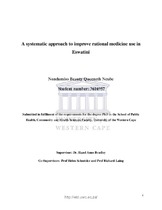| dc.contributor.advisor | Bradley, Hazel Anne | |
| dc.contributor.advisor | Schneider, Helen | |
| dc.contributor.advisor | Laing, Richard | |
| dc.contributor.author | Ncube, Nondumiso Beauty Queeneth | |
| dc.date.accessioned | 2021-02-22T07:05:33Z | |
| dc.date.available | 2021-02-22T07:05:33Z | |
| dc.date.issued | 2020 | |
| dc.identifier.uri | http://hdl.handle.net/11394/7843 | |
| dc.description | Philosophiae Doctor - PhD | en_US |
| dc.description.abstract | Studies on rational medicine use (RMU) have mainly focused on identifying, quantifying, and addressing irrational use without exploring reasons behind this irrational use. In addition, minimal work has been conducted on irrational use of medicines in the context of the growing burden of non-communicable diseases (NCDs). This PhD research examined medicine use in Eswatini, (previously Swaziland) between April 2017 and March 2019, with a focus on prescribing practices linked to specific diagnoses. It further explored factors influencing RMU, which included testing the effects of a short intervention - prescription audit and feedback coupled with small group education - on prescribing practices in health facilities. | en_US |
| dc.language.iso | en | en_US |
| dc.publisher | University of Western Cape | en_US |
| dc.subject | Appropriate medicines use | en_US |
| dc.subject | Medicines use | en_US |
| dc.subject | WHO prescribing indicators | en_US |
| dc.subject | Rational medicine use | en_US |
| dc.subject | Swaziland | en_US |
| dc.subject | Social practice theory | en_US |
| dc.title | A systematic approach to improve rational medicine use in Eswatini | en_US |
| dc.rights.holder | University of Western Cape | en_US |

